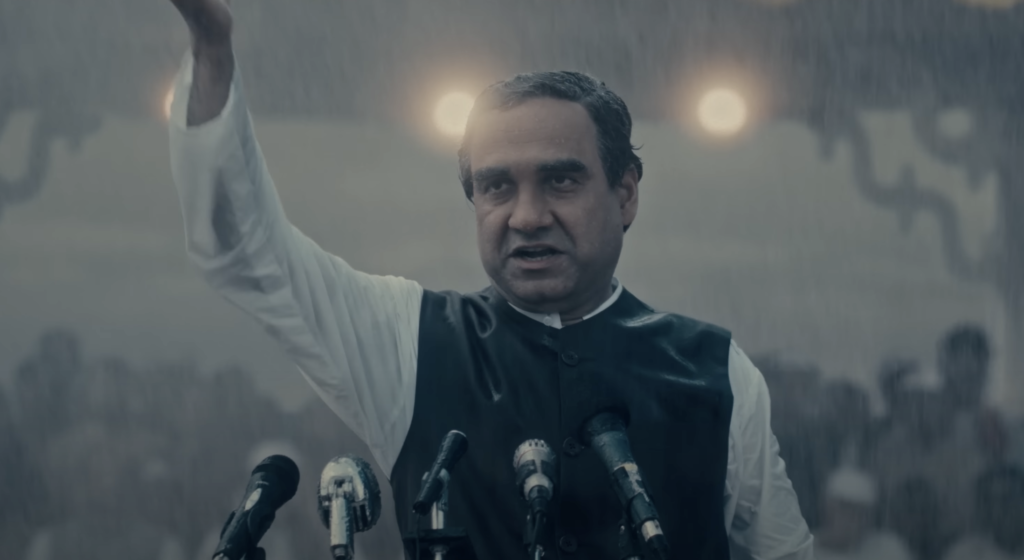Hindi Movie Review: Main Atal Hoon is a hagiographic, overly simple biopic elevated by a strong lead performance

I entered Main Atal Hoon knowing just the basics of the political legacy of Indian Prime Minister Atal Bihari Vajpayee, and I left the movie only barely more educated on him. Sure, over the course of nearly two-and-a-half hours, the film takes viewers through the major beats of Vajpayee’s life – from childhood to just before his death – and captures some of the defining moments of his ascent to PM and his six years in office. But this is a quintessential example of a political biopic that aims less to examine the nuanced views, policy positions, and implementation strategies of its subject and his team, and more to simply reinforce that he was an amazing leader who forged his own path. This is pure hagiography for the fans; if you want to really learn about what made Vajpayee such a force in Indian politics, you are better off using the same amount of time reading Internet sources.
I’m far from opposed to biopics that exist mainly to celebrate the life and work of an icon, but there has to be some substance to the celebration. Main Atal Hoon may cover a lot of ground, but it never really gives the viewer all that much insight into Vajpayee’s motivations to lead or why he held the values he did. The film often shows us how incredibly strong he is in his convictions, devoting his life to the Sangh as a young man, but it doesn’t give us much of the why behind said convictions. Sure, we get a fairly paint-by-numbers depiction of British rule in India and some hints of Hindu spirituality, but little more. By not adequately illuminating the origins of the man’s beliefs, the film narrows its audience to only those who accept that such beliefs are wonderful at face value.
Indeed, viewed cynically, Main Atal Hoon seems chiefly designed as a rah-rah salute to the Hindu right in advance of this year’s upcoming elections in India. While never adopting the inflammatory style of a true propaganda piece, the film heroizes Vajpayee and trivializes his opposition throughout the years in such a black-and-white way that it can’t help but feel like a campaign ad for the similarly-minded Modi government in power today. I don’t have any issue with this from a political standpoint, but as a moviegoer, I certainly wanted a more complex presentation of this history, ideally one that acknowledged more shades of grey.
Further evidencing its political objectives with respect to the present, the film tends to use Vajpayee’s personal pursuits as a way to soften the Indian right and present the left in a hopelessly unflattering light, without really digging into policy. Co-writer/director Ravi Jadhav humanizes Vajpayee less by showing his care for ordinary Indian citizens and more by painting him as a “man of the arts,” seizing every opportunity he gets to remind us that Vajpayee was a poet before he was a politician. It often feels like Jadhav is frantically trying to remind the viewer: “See! Right wingers are artistic and sensitive, too!” By the same token, the film rarely delves into the policy failings of Vajpayee’s political opponents, especially those in the Indira Gandhi government. Its depiction of this material could be summed up as: “Gandhi’s administration was highly corrupt, while the BJP under Vajpayee’s leadership was not at all.”
That’s Main Atal Hoon in a nutshell: despite charting decades of Indian politics, it provides a pretty basic, reductionist view of the events chronicled. This only intensifies when the film reaches Vajpayee’s tenure as PM from 1998-2004, certainly “playing the hits” as far as his main accomplishments go. We get very nationalistic depictions of the Pokhran-II nuclear tests, Vajpayee’s bus ride into Lahore, and the Kargil War. One would, of course, expect a Vajpayee biopic to take on a rather adulatory tone towards his most well-known accomplishments as a leader, but one would also hope for a little more nuance and depth in the depiction of these accomplishments than the film gives us. Main Atal Hoon doesn’t exactly traffic in Great Man Theory – it shows that Vajpayee had to really work to become the leader he was – but it sure expects us to marvel at its subject’s immense wisdom in pivotal national crises without asking any questions.
By the same token, the film doesn’t really attempt to develop the other characters in Vajpayee’s life, maintaining a single-minded focus on its subject. Raja Rameshkumar Sevak gets the most screen-time as Vajpayee’s longtime confidante and ultimate Deputy PM, L.K. Advani, but for a man who was so important to Vajpayee’s life and career, the depiction of Advani seems woefully simplistic. Further, we see him almost entirely through Vajpayee’s eyes, rather than getting a more well-rounded look at the important political figure. Other key players are shorted even more. Perhaps the most resonant depiction is of Vajpayee’s father Krishna (compellingly played by Piyush Mishra), who joins his boy in law school, but he becomes a non-factor very early in the film, with Atal telling him he won’t be able to spend much time with the family in order to be completely devoted to the Sangh.
The strongest part of the movie is Pankaj Tripathi’s performance in the title role. While the 47-year-old actor does come off a little silly in the early going, playing Vajpayee in his twenties with relatively little help from makeup, he is a complete force for most of the film’s running length. Tripathi takes on a larger-than-life figure and gives him human dimension, even if the script does no such thing. While the film itself does the bare minimum to explore Vajpayee’s motivations and internal journey, we can sense a whole story taking place behind Tripathi’s eyes that really elevates the material, especially in the close-up shots. Those who are more familiar with Vajpayee than me have also spoken very favorably of Tripathi’s command of his speech patterns, mannerisms, and temperament.
Alas, the film itself never rises to the level of its lead performance. As political theater, it works just fine, celebrating Vajpayee with stylistic and thematic confidence. I suspect that it will satisfy most ticket buyers, who will go into the movie already in its camp. But if you’re yearning for a political biopic that teaches you about its subject, one that seriously considers the ups and downs of his legacy, this is not that film. Main Atal Hoon is red meat for the base at the start of an election year, simply another way to cheer on the BJP.

